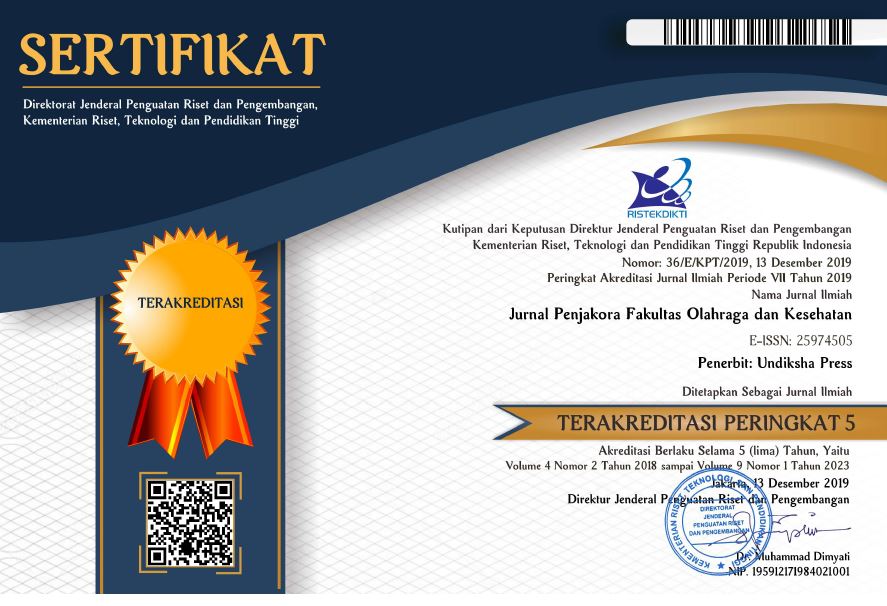PENGARUH LATIHAN HIGH INTERVAL INTENSITY TRAINING DALAM MENINGKATKAN NILAI VOLUME OKSIGEN MAKSIMUM ATLET SEPAKBOLA JUNIOR (U-18)
DOI:
https://doi.org/10.23887/penjakora.v3i1.11664Abstract
Sepakbola merupakan olahraga yang memiliki aktivitas periodikal dengan intensitas tinggi. Oleh karena itu seorang atlet sepakbola harus memiliki performa kebugaran fisik yang optimum. Metode latihan high interval intensity training (HIIT) merupakan metode yang direkomendasikan untuk dapat meningkatkan kapasitas kebugaran fisik atlet. Penelitian ini dilakukan untuk mengetahui pengaruh latihan HIIT dalam meningkatkan nilai volume oksigen maksimum (VO2max) atlet sepakbola junior. Penelitian dilakukan dengan metode eksperimen dimana sampel dibagi dalam kelompok perlakuan dan kelompok kontrol. Dalam kurun waktu 10 minggu, kelompok perlakuan diberi latihan fisik HIIT, sedangkan kelompok kontrol diberikan latihan daya tahan high volume training (HVT). Yo-yo Intermitent Recovery Test (YIRT) dilakukan sebelum dan sesudah program latihan untuk mengukur nilai VO2max atlet. Diketahui bahwa baik latihan HIIT maupun HVT keduanya dapat memberikan peningkatan VO2max, sebesar +3,55 mL/kg.menit dan +0,96 mL/kg.menit berturut-turut. Pengaruh latihan HIIT memberikan peningkatan VO2max yang lebih signifikan dibandingkan latihan HVT.References
Arnason, A., Sigurdsson, S.B. Gudmundsson, A., Holme, I., Engebretsen, L., dan Bahr, R. 2004. Physical Fitness, Injuries, and Team Performance in Soccer. Physical Fitness and Performance.
Bangsbo, J., Mohr, M., dan Krustup, P. 2006. Physical and Metabolic Demands of Training and Match-play in the Elite Football Player. Journal of Sports Science. Vol. 24, hal. 665-674.
Bompa, T.O. 1999. Theory and Methodology of Training: The Key of Athletic Performance. Iowa: Kendal Hunt Publishing Company.
Castagna, C., Impellizzeri, F.M., Chamari, K., Carlomagno, D., dan Rampinini, E. 2006. Aerobic Fitness and yo-yo Continuous and Intermittent Test Performance in Soccer Players: A Correlation Study. Journal of Strength and Conditioning Research. Vol. 20, hal. 320-325.
Dupont, G., Akakpo, K., dan Berthoin, S. 2004. The Effect of in-Season, High-Intensity Interval Training in Soccer Players. Journal of Strength and Conditioning Research. Vol. 18, hal. 584–589.
Gibala, M.J., dan Jones, A.M. 2013. Physiological and Performance Adaptations to High-Intensity Interval Training. Nestle Nutrition Institute Workshop Series. Vol. 76, hal. 51-60.
Kemi, O.J., Haram, P.M., Loennechen, J.P., Osnes, J.B., Skomedal, T., Wisløff, U., dan Ellingsen, Ø. 2005. Moderate vs. High Exercise Intensity: Differential Effects on Aerobic Fitness, Cardiomyocyte Contractility, and Endothelial Function. Cardiovascular Research. Vol. 67 (1), hal. 161-72.
Laursen, P.B., dan Jenkins, D.G. 2002. The Scientific for High-Intensity Interval Training: Optimizing Training Programmes and Maximizing Performance in Highly Trained Endurance Athletes. Sports Medicine. Vol. 32, hal. 53-73.
Pate, R.R. dan Kriska, A. 1984. Physiological Basis of the Sex Difference in cardiorespiratory Endurance. Sports Medicine. Vol. 1 (2), hal. 87-98.
Periard, J. dan Racinais, S. 2013. Adjustment in Footbal Performance Under Heat Stress. Aspetar Sports Medicine Journal. Hal. 120-125.
Rowan, A.E., Kueffner, T.E,, dan Stavrianeas. 2012. Short Duration High-Intensity Interval Training Improves Aerobic Conditioning of Female College Soccer Players. International Journal of Exercise Science, Vol. 5, hal. 232-238.
Sperlich, B., De Mares, M., Koehler, K., Linville, J. Holmberg, H-C., dan Mester, J. 2011. Effects of 5 Weeks of High-Intensity Interval Training vs. Volume Training in 14-years-Old Soccer Players. Journal of Strength & Conditioning Research. Vol. 25, hal. 1271.
Sugiyono. 2011. Metode Penelitian Kuantitatif Kualitatif dan R&D. Bandung: Alfabeta.
Verheijen, R. 1998. Conditioning for Soccer. Spring City : Reedswain.
Wong, P-L., Chaoachi, A., Chamari, K., Dellal, A., dan Wisloff, U. 2010. Effect of Preseason Concurrent Muscular Strength and High-Intensity Interval Training in Professional Soccer Players. Journal of Strength and Conditioning Research. Vol. 24 (3), hal. 653-660.
Downloads
Published
Issue
Section
License
Authors who publish with the JURNAL PENJAKORA agree to the following terms:
- Authors retain copyright and grant the journal the right of first publication with the work simultaneously licensed under a Creative Commons Attribution License (CC BY-SA 4.0) that allows others to share the work with an acknowledgment of the work's authorship and initial publication in this journal.
- Authors are able to enter into separate, additional contractual arrangements for the non-exclusive distribution of the journal's published version of the work (e.g., post it to an institutional repository or publish it in a book), with an acknowledgment of its initial publication in this journal.
- Authors are permitted and encouraged to post their work online (e.g., in institutional repositories or on their website) prior to and during the submission process, as it can lead to productive exchanges, as well as earlier and greater citation of published work. (See The Effect of Open Access)







